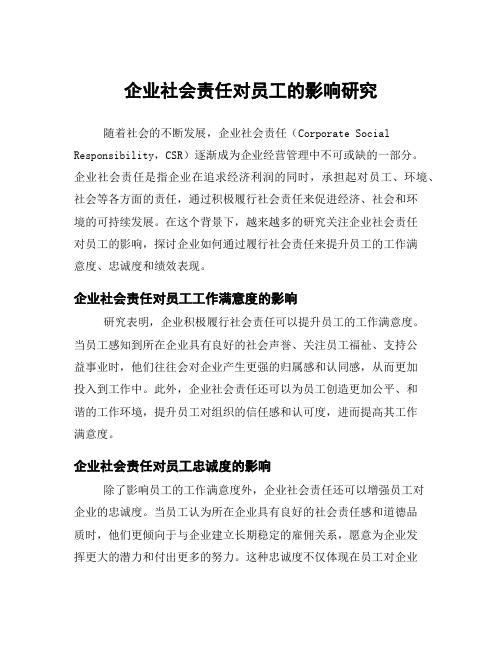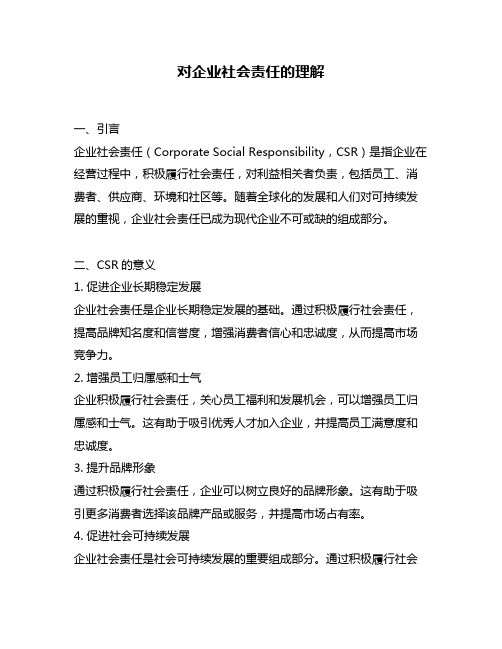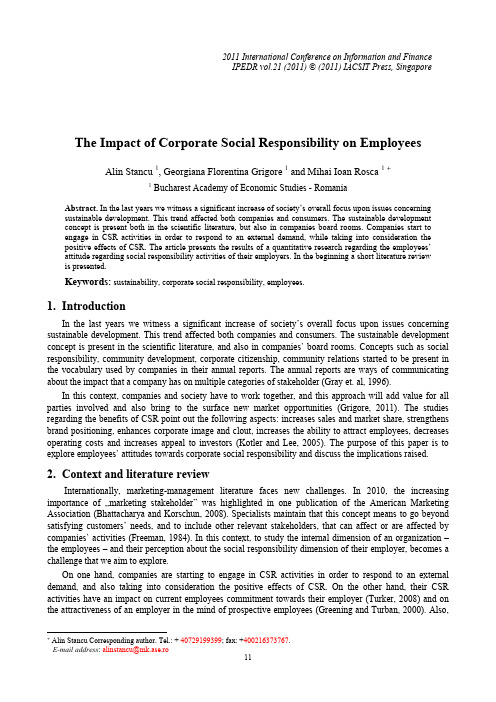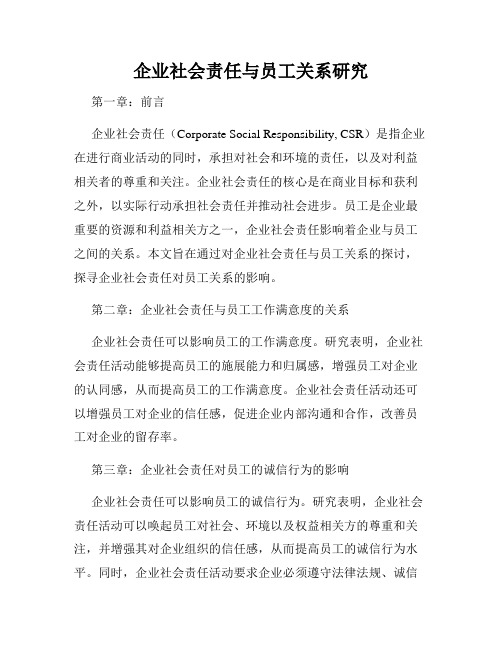企业社会责任(CSR)对员工的影响
探究企业社会责任对员工工作满意度与绩效的影响

探究企业社会责任对员工工作满意度与绩效的影响企业社会责任(CSR)是企业在经营过程中对社会和环境负责的一种行为。
随着社会对企业道德、环保等问题的关注日益增长,CSR已经成为企业成功和可持续发展的重要策略之一。
本文将从员工的角度出发,探究CSR对员工工作满意度和绩效的影响。
一、CSR对员工工作满意度的影响1. 提高员工归属感和自豪感企业积极履行社会责任,关注环保、慈善等社会问题,会使员工产生强烈的归属感和自豪感。
员工意识到自己所服务的企业不仅仅追求经济利益,还关注社会的福祉,这种价值观的一致性会增强员工对企业的认同感,提高工作满意度。
2. 创造积极的工作环境CSR不仅仅包括对外的公益活动,还包括对内的员工关怀和培养。
企业通过提供良好的工作环境、健康的职业发展机会和灵活的工作安排,使员工感受到关心和尊重。
这种关怀和支持可以增加员工对公司的忠诚度和满意度,从而提高工作绩效。
3. 促进员工参与和团队合作企业积极推行CSR活动,鼓励员工积极参与,可以促进员工之间的互动和团队合作。
员工参与公益活动时,体验到团队的力量和合作的乐趣,这种积极的体验可以转化为工作中的合作精神和团队意识,提高工作满意度和绩效。
二、CSR对员工绩效的影响1. 激发员工动力和创新CSR活动通常与企业的使命和愿景相一致,鼓励员工追求更高的社会价值和责任感。
员工参与CSR活动时,会感受到对社会有所贡献的价值,激发他们的动力和创新能力。
这种积极的心态和创造力可以推动员工在工作中表现出更高的绩效。
2. 塑造良好的企业形象企业通过履行社会责任,树立了良好的企业形象。
员工所在的企业如果在社会上享有良好的声誉和信誉,会为员工带来诸多好处,例如更多的业务机会、更好的工作资源等。
这些好处可以激发员工的积极性,促使他们取得更好的绩效。
3. 吸引和留住优秀人才CSR活动的积极影响可以帮助企业吸引并留住优秀的人才。
在竞争激烈的劳动力市场上,有良好的社会责任形象的企业更容易吸引到那些重视企业社会责任的人才。
企业社会责任对员工满意度和绩效的影响研究

企业社会责任对员工满意度和绩效的影响研究企业社会责任(Corporate Social Responsibility, CSR)是指企业在追求经济利益的同时,承担起对社会、环境和利益相关方负责的义务。
随着社会对企业道德、责任和可持续发展的关注不断增加,越来越多的研究关注企业社会责任对员工满意度和绩效的影响。
本文旨在探讨企业社会责任对员工满意度和绩效的影响,并提供一些相关研究结果作为支持。
一、企业社会责任对员工满意度的影响企业社会责任活动对员工的满意度有着积极的影响。
研究表明,企业社会责任行为可以提高员工对企业的认同感和归属感,进而提升员工的工作满意度。
例如,斯特恩和格拉姆斯基(Stern & Graffin, 2013)的研究发现,实施企业社会责任活动的企业能够激励员工更为积极地投入工作,提高他们的满意度。
此外,企业社会责任还可以改善员工的工作环境,并提供良好的福利待遇和培训机会,进一步提升员工的满意度。
二、企业社会责任对员工绩效的影响企业社会责任活动对员工的绩效也具有显著的影响。
前瞻性研究显示,企业的社会责任行为与员工的工作表现之间存在正向关系。
以普华永道(PwC)为例,他们关注全球环境可持续发展并拥有严格的道德准则,这种积极的社会责任行为不仅有助于提升员工的绩效,而且能够赢得客户的信任和忠诚。
此外,根据《战略管理杂志》(Strategic Management Journal)的一项研究,实施社会责任行为的企业更有可能吸引、留住高绩效的员工。
三、企业社会责任的机制企业社会责任对员工满意度和绩效的影响可以通过多种机制实现。
首先,企业社会责任活动展示了企业积极的价值观和道德规范,激励员工更好地兼顾经济利益和社会责任。
其次,企业社会责任创造了良好的组织文化和工作环境,使员工更加满意和投入工作。
第三,企业社会责任活动为员工提供了发展和成长的机会,激励他们提高绩效。
最后,员工对企业的社会责任行为感到满意,能够增强他们的自豪感和归属感,进而促进绩效的提升。
企业社会责任对员工满意度的影响

企业社会责任对员工满意度的影响企业社会责任(CSR)是指企业在经营过程中关注社会、环境和利益相关方的一种行为准则。
随着社会的发展,越来越多的企业意识到履行社会责任的重要性,并通过采取一系列的措施来提升自身的社会形象和声誉。
而企业社会责任对员工满意度的影响也日益受到关注。
本文将探讨企业社会责任对员工满意度的影响,并分析其中的原因。
一、企业社会责任对员工满意度的积极影响1.1 增强员工的归属感和认同感企业积极履行社会责任,关注员工福利、员工培训和职业发展等方面,能够增强员工对企业的归属感和认同感。
员工会感受到企业对他们的关心和重视,从而加强对企业的忠诚度和认同感。
这种情感上的认同会促使员工更加努力地为企业工作,提升员工满意度。
1.2 创造积极的工作环境企业社会责任的履行包括对员工工作环境和福利的关注。
当企业为员工提供良好的工作环境,如健康安全的办公场所和良好的工作氛围时,员工会感到身心舒适,产生满足感和幸福感,从而提高员工对企业的满意度。
1.3 增进员工的自豪感与幸福感企业社会责任的履行使得员工能够参与到社会公益活动中,如捐款助学、环境保护等。
这种参与让员工感受到自己的工作对社会的积极影响,从而增强员工的自豪感和幸福感。
员工在为社会做出贡献的同时,也会感受到企业对于社会的联系和使命感,从而增加对企业的满意度。
二、企业社会责任对员工满意度的消极影响2.1 企业社会责任履行不到位如果企业在履行社会责任方面存在缺失或不充分,没有关注员工福利和工作环境,也没有参与社会公益活动,那么员工会对企业感到失望和不满意,从而降低员工对企业的满意度。
2.2 社会责任营销的虚假宣传有些企业在营销中宣扬自己履行社会责任的种种措施,但实际上没有真正付诸行动。
当员工发现企业的社会责任宣传与实际行为存在差距时,他们会对企业的诚信产生质疑,从而降低对企业的满意度。
三、企业应如何提升员工满意度3.1 加强内部沟通和参与企业应建立定期沟通机制,与员工充分交流,了解员工的需求和关切。
企业社会责任对员工的影响研究

企业社会责任对员工的影响研究随着社会的不断发展,企业社会责任(Corporate Social Responsibility,CSR)逐渐成为企业经营管理中不可或缺的一部分。
企业社会责任是指企业在追求经济利润的同时,承担起对员工、环境、社会等各方面的责任,通过积极履行社会责任来促进经济、社会和环境的可持续发展。
在这个背景下,越来越多的研究关注企业社会责任对员工的影响,探讨企业如何通过履行社会责任来提升员工的工作满意度、忠诚度和绩效表现。
企业社会责任对员工工作满意度的影响研究表明,企业积极履行社会责任可以提升员工的工作满意度。
当员工感知到所在企业具有良好的社会声誉、关注员工福祉、支持公益事业时,他们往往会对企业产生更强的归属感和认同感,从而更加投入到工作中。
此外,企业社会责任还可以为员工创造更加公平、和谐的工作环境,提升员工对组织的信任感和认可度,进而提高其工作满意度。
企业社会责任对员工忠诚度的影响除了影响员工的工作满意度外,企业社会责任还可以增强员工对企业的忠诚度。
当员工认为所在企业具有良好的社会责任感和道德品质时,他们更倾向于与企业建立长期稳定的雇佣关系,愿意为企业发挥更大的潜力和付出更多的努力。
这种忠诚度不仅体现在员工对企业的长期留存意愿上,还表现在员工愿意为企业承担更多义务、主动参与企业发展建设中。
企业社会责任对员工绩效表现的影响另外,研究还发现,企业积极履行社会责任有助于提升员工的绩效表现。
当员工感知到企业具有高度的社会责任感和道德标准时,他们往往会将这种正能量转化为自身工作动力和创造力,更加积极主动地完成工作任务,并且表现出更高的工作绩效。
与此同时,企业通过履行社会责任也能够提供更多培训机会、职业发展空间和激励措施,进一步激发员工的潜力,促进其个人成长和职业发展。
综上所述,企业社会责任对员工产生着深远而积极的影响。
通过积极履行社会责任,企业不仅可以提升员工的工作满意度、忠诚度和绩效表现,还可以构建更加稳固和谐的组织文化氛围,实现共赢共享的可持续发展目标。
对企业社会责任的理解

对企业社会责任的理解一、引言企业社会责任(Corporate Social Responsibility,CSR)是指企业在经营过程中,积极履行社会责任,对利益相关者负责,包括员工、消费者、供应商、环境和社区等。
随着全球化的发展和人们对可持续发展的重视,企业社会责任已成为现代企业不可或缺的组成部分。
二、CSR的意义1. 促进企业长期稳定发展企业社会责任是企业长期稳定发展的基础。
通过积极履行社会责任,提高品牌知名度和信誉度,增强消费者信心和忠诚度,从而提高市场竞争力。
2. 增强员工归属感和士气企业积极履行社会责任,关心员工福利和发展机会,可以增强员工归属感和士气。
这有助于吸引优秀人才加入企业,并提高员工满意度和忠诚度。
3. 提升品牌形象通过积极履行社会责任,企业可以树立良好的品牌形象。
这有助于吸引更多消费者选择该品牌产品或服务,并提高市场占有率。
4. 促进社会可持续发展企业社会责任是社会可持续发展的重要组成部分。
通过积极履行社会责任,企业可以减少环境污染和资源浪费,促进生态平衡和资源节约。
同时,通过关注社区福利和慈善事业,帮助改善社会公共服务水平。
三、CSR的实践1. 关注员工福利企业应该关注员工的基本权益,包括合理的薪酬、安全健康的工作环境、职业发展机会等。
同时,企业还应该提供员工培训和学习机会,帮助员工提高专业技能和素质水平。
2. 关注消费者权益企业应该保障消费者权益,提供安全、健康、优质的产品或服务,并及时解决消费者投诉和问题。
同时,企业还应该积极参与产品或服务相关标准制定和监管机构建设。
3. 关注供应商合作企业应该与供应商建立长期稳定的合作关系,并要求供应商遵守相关法律法规和道德规范。
同时,企业还应该关注供应链中的环境和社会责任问题,积极推动供应链可持续发展。
4. 关注环境保护企业应该积极履行环境保护责任,减少污染排放和资源浪费,推广清洁生产和循环经济模式。
同时,企业还应该关注气候变化、生物多样性等全球性环境问题,并采取相应措施。
企业社会责任对企业员工满意度的影响

企业社会责任对企业员工满意度的影响企业员工满意度是衡量企业人力资源管理绩效的重要指标之一,而企业社会责任(Corporate Social Responsibility,CSR)作为企业的一种经营理念和行为准则,对企业员工满意度有着深远的影响。
本文将从不同角度探讨企业社会责任对企业员工满意度的影响。
1. 提升员工的归属感与荣誉感一家具备良好社会责任感的企业通常会对员工的权益保障、职业发展提供良好的保障和机会。
企业通过关心员工的安全、健康与福利,提供培训和晋升机会,并建立公平的薪酬体系,激励员工更好地发挥才能。
在这样的环境下,员工会感受到企业给予的关怀,增强其对公司的归属感和荣誉感,从而提高员工满意度。
2. 增加员工的参与感与影响力企业社会责任强调员工的参与与公共利益的追求,注重员工对企业决策和运营的参与。
通过员工参与企业社会责任项目的策划和实施,企业能够增加员工的参与感和对企业目标的认同感。
员工通过参与具有社会价值的活动,将自身的价值观与企业的经营理念相结合,进一步提高其在企业中的影响力,从而促进员工满意度的提升。
3. 塑造企业良好的声誉与形象企业社会责任行为不仅仅关乎公司的利益,更关乎企业对社会问题的关注和积极回应。
一家践行企业社会责任的企业在社会中往往享有良好的声誉和形象,这种积极形象对企业的吸引力不仅仅体现在消费者和投资者上,也直接影响到员工的选择与留任。
员工更愿意为一家具备社会责任感的企业工作,并为企业的形象和声誉感到自豪,从而提高员工对企业的满意度。
4. 激发员工的责任心与创新力企业社会责任的推行往往要求员工具备一定的责任心和创新力。
通过参与企业社会责任活动,员工能够锻炼并提高自身的责任心和创新能力,从而使工作得到更好的发挥。
企业也会通过鼓励员工提出创新想法并积极落实,为员工提供发展平台,激发员工的创造力和积极性。
这种创造性工作环境有助于提高员工满意度。
5. 增强员工对企业的信任与忠诚度企业社会责任对员工产生的另一个重要影响是增强员工对企业的信任与忠诚度。
企业社会责任对员工招聘吸引力的影响研究

企业社会责任对员工招聘吸引力的影响研究引言:企业社会责任(CSR)在当今社会中越来越受到关注。
许多企业认识到,通过履行社会责任,不仅可以为社会做出贡献,还可以提高公司的声誉并吸引顶级人才。
本文将探讨企业社会责任对员工招聘吸引力的影响。
1. 提升公司声誉:企业社会责任在提升公司声誉方面发挥着关键作用。
员工通常会选择那些有着良好声誉的公司来谋求工作机会。
通过参与慈善活动、环保倡议等社会责任项目,企业可以树立起正面的形象,并在招聘过程中吸引更多的优秀人才。
2. 增加员工满意度:员工对企业的社会责任感兴趣和认同,可以增加其对公司的满意度。
当员工对公司的社会价值观有认同感时,他们更愿意为企业付出努力,提高工作效率和质量。
这也意味着企业能够吸引到更有动力和有责任感的员工。
3. 增强员工的归属感:企业社会责任的实施可以增强员工对企业的认同感和归属感。
员工会意识到他们所在的企业不仅仅是为了盈利,而是有着更大的社会使命。
这种认同感可以促使员工更加忠诚,并愿意为企业长期发展做出贡献。
4. 提高员工的工作动力和创造力:企业社会责任的实施可以激发员工的工作动力和创造力。
员工会感到他们的工作与一个更大的目标相关联,他们的工作对于实现社会责任非常重要。
这种意识可以激励员工更加努力地工作,追求更高的工作成就和个人发展。
5. 优化员工招聘和保留:企业社会责任的实施可以帮助企业吸引更多的优秀员工并留住他们。
在竞争激烈的人才市场中,企业所展示的社会责任能够成为吸引顶级人才的关键因素。
同时,企业通过提供良好的工作环境和员工福利,以及履行社会责任,可以留住现有的优秀员工,减少人员流失。
结论:企业社会责任对员工招聘吸引力有着积极的影响。
通过提升公司声誉、增加员工满意度、增强员工的归属感、激发员工的工作动力和创造力、优化员工招聘和保留等方式,企业能够吸引到更多优秀的人才。
因此,企业应当重视社会责任的履行,并将其作为人力资源管理的重要策略之一。
CSR员工责任

引言概述:在企业社会责任(CorporateSocialResponsibility,简称CSR)的实践中,员工责任是其中一个重要的方面。
本文将对员工责任的相关概念进行阐述,并从五个大点来详细探讨CSR员工责任的具体内容和实施方法。
正文内容:一、员工福利1.提供公平合理的薪酬体系,确保员工获得应有的报酬;2.提供良好的工作环境和劳动条件,保障员工的安全和健康;3.提供基本的福利待遇,如养老保险、医疗保险等,满足员工的基本生活需求;4.关注员工的培训和职业发展,提供晋升和晋级机会,激励员工的个人成长。
二、员工关系1.建立积极和谐的劳动关系,尊重员工的权益和参与决策的权力;2.鼓励开展员工参与活动,如意见征集、内部沟通等,提高员工参与和归属感;3.建立员工代表机制,确保员工的代表有机会参与企业决策与规划;4.加强员工与企业之间的沟通,促进共同发展和合作;5.建立员工离职管理机制,关注员工的离职原因和感受,改善员工流失情况。
三、员工培训1.制定培训计划,根据员工个人发展需要提供相应的培训机会;2.注重培养员工的专业技能和职业素质,提高员工在职场中的竞争力;3.定期进行岗位能力评估,帮助员工了解自己的发展方向和提升空间;4.鼓励员工参加外部培训和学术交流,促进员工的学习和进步;5.关注员工的培训反馈和效果评估,不断改进培训方式和内容。
四、员工参与社会公益1.组织员工参与社区志愿者活动,为当地社区提供有益的服务;2.倡导员工参与环保行动,推动可持续发展;3.设立员工慈善基金,鼓励员工参与捐款和公益活动;4.鼓励员工成立绿色团队,推动节能减排的行动;5.积极响应社会公益事业,通过员工参与社会活动塑造企业良好形象。
五、员工职业道德与道德教育1.建立职业道德规范,明确员工的职业行为准则;2.组织道德教育培训,提高员工的道德意识和职业操守;3.强调员工的诚信和廉洁,反对腐败行为;4.建立员工举报机制,保护员工的合法权益和利益。
企业社会责任的重要性

企业社会责任的重要性企业社会责任的重要性企业社会责任(Corporate Social Responsibility,CSR)是指企业在追求经济利润的同时,也承担起对社会、环境及利益相关方的责任。
在当今社会,企业社会责任已成为企业发展的重要组成部分,具有重要性如下:1. 提升企业声誉与形象企业社会责任的履行可以树立企业良好的品牌形象和公众声誉。
消费者更愿意选择支持那些积极负责的企业,因为它们被认为更具诚信、价值观和社会责任感。
通过积极开展公益事业、关注环境保护等活动,企业可以树立起良好的形象,赢得公众的认可和尊重。
2. 建立积极的共享价值观企业社会责任有助于公司和员工树立共享的价值观念。
通过承担社会责任,企业能够激励员工参与到公益事业中,增强员工的责任感和使命感,加强企业内部凝聚力和向心力。
同时,公司也能通过这种价值观的倡导吸引更多有责任感和社会担当的人才加入,形成良好的竞争优势。
3. 促进可持续发展企业社会责任要求企业在经营过程中兼顾社会、环境和经济的可持续发展。
积极履行企业社会责任能够推动企业实现绿色、低碳、环保的经营方式,降低资源消耗和环境污染,为未来的可持续发展创造条件。
同时,企业还需要关注员工的福利和发展,实现企业与员工的共同成长和共赢。
4. 增强和谐的利益相关方关系企业社会责任的履行能够促进企业与利益相关方之间的和谐关系。
企业与社会、政府、供应商、客户等利益相关方之间的合作和互动,都需要建立在公平、诚信和共赢的基础上。
通过关注和满足利益相关方的需求,企业能够建立稳定的利益共享机制,减少各方之间的矛盾和风险,提高企业的竞争力和可持续发展能力。
5. 推动社会进步和发展企业社会责任不仅仅是企业自身的责任,也是推动社会进步和发展的重要力量。
企业通过开展公益事业、支持教育、减贫扶弱等活动,积极参与社会事务,为社会的和谐稳定发挥积极作用。
通过资金、技术和资源的支持,企业与社会共同努力,能够为社会提供更多的机会和资源,推动社会实现全面进步和发展。
企业社会责任(CSR)对员工的影响

2011 International Conference on Information and FinanceIPEDR vol.21 (2011) © (2011)IACSIT Press, SingaporeThe Impact of Corporate Social Responsibility on EmployeesAlin Stancu 1, Georgiana Florentina Grigore 1 and Mihai Ioan Rosca 1+1 Bucharest Academy of Economic Studies - RomaniaAbstract. In the last years we witness a significant increase of society’s overall focus upon issues concerning sustainable development. This trend affected both companies and consumers. The sustainable development concept is present both in the scientific literature, but also in companies board rooms. Companies start to engage in CSR activities in order to respond to an external demand, while taking into consideration the positive effects of CSR. The article presents the results of a quantitative research regarding the employees’ attitude regarding social responsibility activities of their employers. In the beginning a short literature review is presented.Keywords: sustainability, corporate social responsibility, employees.1.IntroductionIn the last years we witness a significant increase of society’s overall focus upon issues concerning sustainable development. This trend affected both companies and consumers. The sustainable development concept is present in the scientific literature, and also in companies` board rooms. Concepts such as social responsibility, community development, corporate citizenship, community relations started to be present in the vocabulary used by companies in their annual reports. The annual reports are ways of communicating about the impact that a company has on multiple categories of stakeholder (Gray et. al, 1996).In this context, companies and society have to work together, and this approach will add value for all parties involved and also bring to the surface new market opportunities (Grigore, 2011). The studies regarding the benefits of CSR point out the following aspects: increases sales and market share, strengthens brand positioning, enhances corporate image and clout, increases the ability to attract employees, decreases operating costs and increases appeal to investors (Kotler and Lee, 2005). The purpose of this paper is to explore employees` attitudes towards corporate social responsibility and discuss the implications raised. 2.Context and literature reviewInternationally, marketing-management literature faces new challenges. In 2010, the increasing importance of …marketing stakeholder” was highlighted in one publication of the American Marketing Association (Bhattacharya and Korschun, 2008). Specialists maintain that this concept means to go beyond satisfying customers’ needs, and to include other relevant stakeholders, that can affect or are affected by companies` activities (Freeman, 1984). In this context, to study the internal dimension of an organization – the employees – and their perception about the social responsibility dimension of their employer, becomes a challenge that we aim to explore.On one hand, companies are starting to engage in CSR activities in order to respond to an external demand, and also taking into consideration the positive effects of CSR. On the other hand, their CSR activities have an impact on current employees commitment towards their employer (Turker, 2008) and on the attractiveness of an employer in the mind of prospective employees (Greening and Turban, 2000). Also, + Alin Stancu Corresponding author. Tel.: + 40729199399; fax: +400216373767.it is highlighted that employees have sufficient power, legitimacy, and urgency to become salient stakeholders to management (Mitchell et al., 1997), therefore they are considered to be a relevant group of stakeholders for each organization.The role of corporate social responsibility on employees is becoming more present in the business world, one of the reasons being that successful companies should attract, retain the best work force. By creating a good working environment and developing the internal marketing strategies, companies can stimulate productivity and satisfaction among employees. If employees are satisfied and attach the company, they will recommend to friends and family as a good employer (Bhattacharya et al., 2008)In the classical approach, many companies consider that the client is only interested in the final product that he buys, and not necessarily in how it is produced. Currently, however, consumers begin to evaluate companies in terms of working conditions of the company. Quality of products or services of a company depends to an extent of the degree of motivation and training of its employees. That is why the company should look at employees from the stakeholder theory perspective and consider their requests. Marketing science developed the concept of internal marketing, which involves targeting the marketing efforts within the company to its employees. In this context, promoting corporate social responsibility inside the company and encouraging employees to participate in these activities, allows the companies to develop a strong relation with its internal stakeholders (Harwood et. al, 2008). When the level of the quality of relationship between a company and employees improve, the customer satisfaction increases as well, and this cycle of success leads to an improved profit margin (Schlesinger and Heskett, 1991).Considering the internal marketing approach, each employee is considered as an extension of the corporate image and in this regard an important determinant of consumer’s satisfaction. For a company, the benefits of social responsibility in the internal marketing concerns (Hoeffler et al., 2010): •Development of holistic relations with its employees;•Meeting the altruistic needs and desires;•Interaction with customers and employees in non-commercial circumstances.A recent study measures the extent to which employees are involved in marketing programs related to a case in a company (Li et al., 2010). This study focuses on a company's internal stakeholders - employees, and the degree of their involvement in the selection of social campaigns. While the difficulties of running a business that has lost legitimacy in the eyes of employees are well known, there isn`t as much understanding on the extent to which managers and non-profit partner are considering the opinions of employees, and involve them in choosing the causes. It was investigated the involvement of employees in cause related marketing campaigns and benefits of such action by telephone interviews with non-profit organizations and top managers of companies in services. Results showed the following:•degree of participation of employees vary significantly from company to company;•large marketing campaigns linked to a central question tend to be driven with a relatively low employee participation than if smaller campaigns•financial services companies are more willing to make decisions regarding marketing linked to a central question with a relatively small participation of employees than retailers.Starting from these challenges that we observed in the international literature review, in this article we aim to explore employees` perception on social responsibility and to present the results of a quantitative research conducted inside the companies.3.MethodologyThe objective of this study is to assess the attitudes of the Romanian employees regarding the CSR activities in general, and of their company in particular, by pointing out the following dimensions: (1) the relevance of CSR activities to employees, (2) the criteria that builds the image of a responsible employer in the eyes of employees and (3) the employees involvement in social or environmental activities. In order to reach this objective the authors developed an online survey, as this research method offers several advantages: the possibility to reach a vast number of respondents, in a rapid way and with low costs. Also, it offers flexibility and a possibility for respondents to feel comfortable in their environment.Recent studies showed that the social performance of the company influences also the economic one,even thought is very difficult to measure it (Ali et al., 2010). One of the directions analysed in the scientificliterature is the influence of CSR on the internal stakeholders, many of them focusing on the potential ofCSR in attracting employees and building an employer brand (Turker, 2008; Kim et al., 2010). Even so, littleattention has been given to the attitudes of the employees regarding CSR. Attitudes are judgments of value regarding a certain aspect. The process of building an attitude is based on three components: a cognitive one,an affective one and a conative one (Quester and Lim, 2003; van der Brink et al. 2006). In this regard ourstudy takes into account the evaluation of the level of understanding of CSR activities, their importance and employees` level of involvement.3.1.MeasuresThe questionnaire measures the attitudes of the employees regarding CSR. We used for this the Osgoodscale (1 unimportant-5 very important) and Likert scale, but also nominal one. The questionnaire includestwo sections: (1) questions that aim to identify the extent to which employees are aware of the CSR activities developed by their employer and (2) demographic questions. An important aspect in this study was to definewhat we mean by “employee”. In this study we didn’t include the employees with middle and top management because those can alter the results of the study, as they are involved in the decision process, andhave the tendency of defending the corporate culture.3.2.Sample and collection of dataData was collected using an online questionnaire. Potential respondents were contacted by email andasked to fill in the questionnaire and recommend other potential respondents. Three hundred and fifty questionnaires were collected and 245 usable questionnaires remained in the sample after verifying the completion accuracy. The sample consisted only of employees from urban areas from all types of companies.Table 1. The Structure of the sampleSex ( n=245, 0 missing) Education (n=245, 0 missing)Male 38,80%school 22,90% Female 61,20% HighTotal 100% University 40%Income per month ( n=245, 0 missing)Masters 35,50% 125-375 EUR 14,7% Other 1,60%376- 625 EUR 29,8% TOTAL 100%626 -875 EUR 18,4%Above 875 EUR 37,1% Work experience (n=245, 0 missing)TOTAL 100% less than 2 years 26,1%Age (n=245, 0 missing) 2-5 years 44,9%18-25 31,00% 6-10years 19,2%years 9,8%26-35 43,70% above1036-45 18,00% Total 100,0%above 46 7,30%Total 100%4.ResultsIn the first part of the study the authors asked the employees what aspects they take into account whenforming the image of an employer brand. Several options are given for consideration. Table 2 presents thesecriteria and the responses for each of them.Table 2.The criteria for building an employer brandCriteria Frequency PercentYES NO YES NOSafe and healthy work environment 1875876,33% 23,67% Respect the rights of employees 2153087,76% 12,24% Improving the quality of life of employees at work and outsideit1529362,04% 37,96% Employee involvement in social and environmental problems 8216333,47% 66,53% Transparency in communicating with employees 1648166,94% 33,06% Non-discrimination in employment and profession 13910656,73% 43,27% Fair wages and benefits package 2063984,08% 15,92% Professional and personal development opportunities toemployees1875876,33% 23,67% Responsible approach to restructuring in case of crisis 8815735,92% 64,08% As we see in Table 2 the employees considers that the brand of the employer is built by respecting the rights of the employees (87%), fair wages (84%) and safety at work and employee professional development (76%). Regarding the involvement of the employees in solving social and environmental problems the employees didn’t found this item important for the employers’ brand (33.47%). This result show that employees demands from the company to act in a responsible way, but when it comes for him to be involved, this doesn’t represent an important thing.Another aspect, relevant for our research was to determine in which social responsibility activities organized by the company the employees are involved. Considering the total number of 245 respondents, just 87 of them declared that they didn’t participated in any activity. The most attractive CSR activities for employees are donations and selective recycling, and another important aspect is that the women are more engaged in CSR activities compared to men.Table 3.Types of CSR activities that employees are engaged inActivity FrequencyTOTALMale FemaleVolunteer for community support 233154 Donations to support certain social causes 385997 Selective recycling 295483 Blood donation 172542I have not participated in any of the activities 335487Regarding the perception of employees on the company’s involvement in social causes and environmental issues the respondents answered that they consider their company mainly responsible (Table 4).Table 4. Employee perception on the company’s involvement in social and environmental issuesIssue Veryresponsible Responsible Indifferent LessresponsibleIrresponsibleInvolvement in supporting socialcauses13,47%39,18%31,02%11,43% 4,90%Company's involvement inenvironmental issues13,47%39,59%27,76%14,29% 4,90% 5.Conclusions and further researchIn summary, the purpose of this study is to obtain a better understanding of how the employees perceive the CSR activities developed by their employer and what is their attitude towards these. The findings from an online survey reflect that several important aspects. Firstly, the majority of respondents consider that respecting the employees` rights, fair wages and safety at work are the most prevalent dimensions in the image of a responsible employer. Secondly, the research shows that women are more likely to engage in CSR activities compared to men. Thirdly, most of employees are aware of the CSR activities of theiremployer, but fewer are actually involved in these activities. A possible explanation for this third aspect is that CSR activities are vaguely presented and introduced in the companies.In order to develop a fuller insight into the issues raised in this study, the authors aim to develop the scope of the research and investigate what is the impact of CSR activities on employees` organizational commitment and job satisfaction. Also, another interesting future research it would be to compare different CSR activities (cause related marketing, philanthropic activities, volunteering, etc.) and to analyse their impact on employees.6.AcknowledgementsThis work was supported by CNCSIS/UEFISCUS project PNII-IDEI code 1888/2008.7.References[1]I. Ali, K.U. Rehman, S.I. Ali, J. Yousaf and M. Zia. Corporate social responsibility influences employeescommitment and organizational performance. African Journal of Business Management. 2010, 4 (12): 2796-2801.[2] C.B. Bhattacharya, D. Korschun and S. Sen. Using Corporate Social Responsibility to Win the War for Talent.MIT Sloan Management Review, 2008, 49 (2): 37-44.[3] C.B. Bhattacharya and D. Korschun. Stakeholder Marketing: Beyond the Four Ps and the Customer. Journal ofPublic Policy & Marketing. 2008, 27 (1): 113-116.[4] D. Bielak, S. Bonini and J.M. Oppenheimer. CEOs on Strategy and Social Issues. McKinsey Quarterly. 2007, 4:8–12.[5]P.N. Bloom, S. Hoeffler, K.L. Keller and C.E. Basurto. How Social Cause Marketing Affects ConsumerPerceptions. MIT Sloan Management Review. 2006, 47 (2): 49-55.[6]Freeman, R.E. Strategic Management: A stakeholder approach, Boston: Pitman, 1984.[7]R. Gray, D. Owen and C. Adams. Accounting and Accountability: Changes and Challenges in Corporate Socialand Evironmental Reporting. London: Prentice Hall, 1996.[8] D.W. Greening and D.B. Turban. Corporate social performance as a competitive advantage in attracting qualityworkforce. Business and Society. 2000, 39 (3): 254-280.[9]G.F. Grigore. Corporate Social Responsibility and Marketing in G. Aras and D. Crowther (eds). Governance in theBusiness Enviroment – Developments in Corporate Governance and Responsibility, Vol. 2, Emerald Publishing, 2011.[10]T. Harwood, T. Garry and A. Broderick. Relationship Marketing: Perspectives, Dimensions and Contexts.McGraw-Hill: Berkshire, 2008.[11]S. Hoeffler, P.N. Bloom and K.L. Keller. Understanding Stakeholder Responses to Corporate CitizenshipInitiatives: Managerial Guidelines and Research Directions. Journal of Public Policy & Marketing. 2010,29 (1): 78-88.[12]H.R. Kim, M. Lee, H.T. Lee and N.M. Kim. Corporate Social Responsibility and Employee–CompanyIdentification. Journal of Business Ethics. 2010, 95 (4): 557-569.[13]P. Kotler and N. Lee. Corporate social responsibility: doing the most good for your company and your cause.Hoboken: John Wiley, 2005.[14]G. Liu, C. Liston-Heyes and W. Ko. Employee Participation in Cause-Related Marketing Strategies: A Study ofManagement Perceptions from British Consumer Service Industries. Journal of Business Ethics. 2010, 92 (2): 195-210.[15]R.K. Mitchell, B.R. Agle and D.J. Wood. Toward a theory of stakeholder identification and salience: defining theprinciple of who and what really counts. Academy of Management Review. 1997, 22 (4): 853-886.[16]P. Quester and A.L. Lim. Product involvement/brand loyalty: is there a link? Journal of Product and BrandManagement. 2003, 12 (1): 22-38.[17]L.A. Schlesinger and J.L. Heskett. The service-driven service company. Harvard Business Review. 1991, 69 (5):71-81.[18]D. Turker. How Corporate Social Responsibility Influences Organizational Commitment. Journal of BusinessEthics. 2008, 89 (2): 189-204.[19]D. van den Brink, G. Odekerken-Schroder and P. Pauwels. The effect of strategic and tactical cause-relatedmarketing on consumers` brand loyalty. Journal of Consumer Marketing. 2005, 23 (1): 15-25.。
企业社会责任对员工工作满意度的影响

企业社会责任对员工工作满意度的影响企业社会责任(Corporate Social Responsibility,CSR)是企业在追求经济利益的同时,承担起对社会和环境的责任的行为。
随着社会的发展和人们意识的提高,越来越多的企业开始关注和实施社会责任,并且逐渐意识到企业社会责任对员工工作满意度的影响。
本文将探讨企业社会责任对员工工作满意度的影响,并分析其中的原因和机制。
一、企业社会责任对员工工作满意度的积极影响1. 创建正面企业形象:企业积极履行社会责任,能够树立积极的企业形象,使员工对企业的认同感提高。
员工将会感到自豪,并觉得自己所从事的工作有价值,从而增加对工作的满意度。
2. 增强员工的幸福感:企业社会责任的实施通常会带来一系列与员工福利相关的措施,如提供良好的工作环境、健康、安全的劳动条件,关注员工的健康和福利等。
这些举措能够增加员工的幸福感,降低工作压力,从而提高工作满意度。
3. 增强员工的归属感:企业积极参与社会公益活动、社区建设等,能够提高员工的社会认同感和归属感。
员工会感到自己所在的企业是一个与社会紧密联系的存在,产生一种身份认同感,从而增强对企业的忠诚度,提高工作满意度。
二、企业社会责任对员工工作满意度的深层影响机制1. 心理契约理论:企业社会责任的实施会增加员工对企业的信任感和认同感,使员工感受到组织对他们的重视和关心。
心理契约得到满足的员工更容易对工作产生积极的态度,提高工作满意度。
2. 投入-回报模型:企业对社会承担的责任能够为员工创造更好的工作条件和福利待遇,提供更多的机会和资源。
员工会感受到企业对自己的关注和支持,从而产生更高的工作满意度。
3. 社会认同理论:企业积极履行社会责任能够提升员工的社会认同感。
员工会将自己与企业紧密联系在一起,形成一种社会身份认同。
这种认同感和关联性会增加员工对企业的归属感和忠诚度,进而增强工作满意度。
三、企业应注重的策略和措施1. 建立健全的企业社会责任体系:企业应该明确社会责任的目标和范围,建立相应的组织机构和流程,确保责任的有效实施和监督。
企业社会责任对员工工作动机的影响

企业社会责任对员工工作动机的影响企业社会责任(Corporate Social Responsibility,简称CSR)是指企业在经济、环境和社会等方面承担的责任和义务。
在当今社会,越来越多的企业意识到了CSR对于企业长期发展的重要性。
本文将探讨企业社会责任对员工工作动机的影响,并分析其原因及可行性。
一、企业社会责任对员工工作动机的积极影响1. 提高员工归属感和自豪感企业积极履行社会责任,关注环境保护、社会公益等问题,能够给员工一种身份认同感,增加对企业的归属感和自豪感。
员工感到自己所在的企业是一个有社会责任感的企业,他们会更加愿意为企业付出努力,因此具有更高的工作动机。
2. 增进员工对企业的信任积极履行社会责任的企业更容易赢得员工的信任。
员工会认为企业对社会的责任承担体现了企业的价值观和企业文化,他们更愿意与这样的企业共同成长,进而提高了工作动机。
相反,对社会责任漠然置之的企业会引发员工的不满和负面情绪,从而降低其工作动机。
3. 增强员工自我认同感企业的社会责任行为往往体现了企业的核心价值观和社会使命。
员工能够透过企业的社会责任行为,认同和接受企业的核心价值观,并将其融入到自己的工作中。
这种自我认同感将激发员工的工作动机,使其更加积极主动地投入工作。
二、企业社会责任对员工工作动机的原因分析1. 员工对企业形象的认同企业社会责任行为是企业形象的重要组成部分,而企业形象对员工产生了重要影响。
员工在选择就业机会时,会优先选择那些具有良好社会声誉和高度社会责任感的企业。
因此,企业积极履行社会责任能够提高员工的工作动机,因为员工从内心认同并愿意为这样的企业工作。
2. 满足员工的价值诉求现代员工对于工作的价值要求越来越高,他们不仅仅看重薪酬待遇,更看重工作的社会意义和价值。
企业积极履行社会责任,关注环保、公益等社会问题,能够满足员工追求有意义工作的价值诉求,提高其工作动机。
3. 增加员工的认同感企业在履行社会责任的过程中,往往需要员工的积极参与和支持。
企业社会责任对员工满意度的影响

企业社会责任对员工满意度的影响在当代社会中,企业社会责任(Corporate Social Responsibility,CSR)受到越来越多的关注。
企业社会责任是指企业在经营过程中考虑到社会利益和责任,不仅仅追求经济利益,而是关注社会环境、社会福利和员工福利等方面。
在这篇文章中,我们将探讨企业社会责任对员工满意度的影响。
1. 提高员工工作动力和参与度企业社会责任的实践可以激励员工的工作动力和参与度。
当员工看到公司关注社会福利,积极参与公益和慈善活动,他们会感到自己所从事的工作与社会价值紧密相连。
这将激发员工的自豪感和满足感,使他们更加愿意付出努力,为公司的发展贡献力量。
例如,一家企业组织员工参与公益活动,员工参与度提高了,他们在工作中表现出更高的工作动力和积极性,从而提高了整体的员工满意度。
2. 增强企业员工间的团结和合作企业社会责任也有助于增强企业员工间的团结和合作。
在实践企业社会责任的过程中,公司通常会组织各种团队活动,这些活动可以促进员工之间的交流和合作。
当员工在公益活动中共同努力,解决问题和克服挑战时,他们之间的团结感和合作意识将得到增强。
这种团结感会延续到他们的工作环境中,促进团队合作和协作,提升员工对企业的满意度和忠诚度。
3. 提供良好的工作环境和福利待遇企业社会责任的实践还包括提供良好的工作环境和福利待遇,这对提高员工的满意度起着重要作用。
公司通过关注员工的安全、健康和福利,提供舒适的工作环境和具有竞争力的福利待遇,能够增加员工对工作和公司的满意度。
例如,一家公司为员工提供灵活的工作时间和福利待遇,使员工感受到公司的关爱和支持,从而提高了员工的工作满意度。
4. 建立积极的企业形象企业社会责任的实践对于建立积极的企业形象也起到关键作用。
当企业在社会责任方面表现出色时,员工会对公司产生更强的认同感和归属感。
他们愿意为这样一家有着良好社会形象的公司工作,并为之奉献自己的力量。
同时,这种积极的企业形象也会吸引更多优秀的人才加入,进一步提升员工满意度和企业竞争力。
企业社会责任对员工工作表现的影响

企业社会责任对员工工作表现的影响企业社会责任(CSR)是一种企业在经营活动中积极承担社会责任的行为。
它旨在推动社会可持续发展,促进经济、环境和社会的和谐发展。
在现代商业环境中,越来越多的企业意识到,积极履行社会责任不仅有助于提升企业声誉,还能对员工工作表现产生积极影响。
本文将探讨企业社会责任对员工工作表现的影响。
首先,企业社会责任的积极履行能够增强员工的归属感和工作满意度。
当企业将CSR视作其核心价值观的一部分,并在日常运营中注重环保、公益慈善等方面的责任时,员工会感受到企业对社会的关注和贡献。
这种关注和贡献使员工对企业产生认同感,并认同企业的价值观。
作为回应,员工则会更加积极地投入工作,增强工作动力,提高工作效率和质量。
他们会感受到自己为一个有意义的企业工作,为社会做出贡献的价值,从而提升员工的工作满意度和归属感。
其次,企业社会责任的积极履行可以促进员工的职业发展和成长。
一家有良好社会责任意识的企业通常会提供各种培训和发展机会,包括技能培训、职业规划指导等。
这些机会有助于员工不断提升自己的能力和技术水平,并且在工作中得到实践和应用。
企业的培训和职业发展计划可以让员工感受到企业对他们的关心和支持,增强员工的自信心和职业满足感。
在这个过程中,员工会表现出更好的工作能力,展现出对工作的热情和专业程度。
此外,企业社会责任的执行也对员工的团队合作和协作能力产生积极影响。
通过参与志愿者活动、组织员工公益项目等方式,企业能够促进员工之间的合作和沟通。
这种合作和沟通不仅在日常工作中体现出来,也在解决问题和迎接挑战时发挥作用。
员工通过参与社会责任项目,学会倾听他人的声音、处理不同的意见和观点,提高自己的团队合作和协作能力。
这种能力的增强不仅对员工的个人发展有益,也对整个企业的运营效率和团队凝聚力产生积极的影响。
最后,企业社会责任的履行有助于提升员工的自我认同和价值观。
当员工所在的企业积极履行社会责任时,他们会被视为企业的一部分,并且与企业的价值观、使命和愿景保持一致。
企业社会责任对员工福利的影响研究

企业社会责任对员工福利的影响研究随着当代社会的发展,企业社会责任(CSR)在全球范围内成为一个热门话题。
而CSR对员工福利的影响成为研究的重点之一。
本文将探讨企业社会责任对员工福利的积极影响,并分析其可能的负面效应。
首先,企业社会责任对员工福利产生了积极影响。
一方面,实施有效的CSR政策有助于提升员工的生活质量。
诸如提供灵活的工作安排、关注员工身心健康、组织培训和发展计划等措施不仅能够增强员工的工作满意度,还能促进员工个人的成长和发展。
另一方面,通过充分考虑员工的利益、提供良好的工作环境和合理的劳动条件,企业社会责任可以提高员工的幸福感和忠诚度,从而增强员工与企业的关系。
此外,企业社会责任对员工福利的影响还体现在福利待遇方面。
很多企业通过提供具有竞争力的薪酬和福利,如健康保险、养老金计划和福利补贴等,来吸引和留住高素质的员工。
这些福利不仅可以提高员工的收入水平,还有助于改善员工的生活品质。
此外,部分企业还通过提供高质量的子女教育、休假和度假等福利,来关注员工家庭的需求和福祉。
这种以员工为中心的关怀不仅能够提高员工的幸福感,还有助于塑造企业良好的形象。
尽管企业社会责任对员工福利产生了积极影响,但也存在着一些潜在的负面效应。
首先,一些公司可能会过于关注对外的形象和声誉,而忽视了内部员工的需求。
他们可能把更多的资源投入到社会慈善活动中,而忽视了员工的薪酬待遇和工作条件。
这种情况下,员工的福利可能无法得到充分保障,从而导致员工不满和流失。
其次,过于强调企业社会责任可能导致对员工的过度依赖和消极行为。
一些员工可能会利用企业社会责任的理念,要求公司提供更多的福利和权益。
一些懒惰或不称职的员工可能会依靠企业社会责任政策来获得更多的权益,而不努力工作或提升自己的能力。
这可能导致员工之间的不公平感和团队效率的下降。
为了避免这种负面效应,企业需要重视平衡员工福利和企业利益的关系。
企业应该根据实际情况制定合理的CSR政策,并明确传达给员工。
企业社会责任对员工工作满意度的影响

企业社会责任对员工工作满意度的影响第一章:引言企业社会责任(Corporate Social Responsibility,简称CSR)是指企业在追求经济利益的同时,对员工、社会和环境也承担起相应的责任。
随着企业社会责任理念的深入人心,越来越多的研究开始关注企业社会责任对员工工作满意度的影响。
本文将探讨企业社会责任对员工工作满意度的积极影响,并提出相关建议。
第二章:企业社会责任与员工工作满意度的关联2.1 企业社会责任的定义和要素企业社会责任是企业对社会和环境问题负有应尽的责任。
一般来说,企业社会责任包括经济责任、法律责任、道义责任和慈善责任。
通过履行这些责任,企业能够在社会中扮演更积极的角色。
2.2 员工工作满意度的概念和影响因素员工工作满意度是指员工对个人工作环境和工作内容的满意程度。
员工工作满意度受到多个因素的影响,如工资福利、工作内容、工作环境和组织文化等。
满意的员工通常对工作更加投入,对企业更有忠诚度。
2.3 企业社会责任对员工工作满意度的积极影响研究表明,企业社会责任对员工工作满意度有着积极的影响。
首先,企业社会责任能够提升员工的认同感和归属感,使他们对企业更加满意。
其次,通过履行社会责任,企业能够增加员工对自身工作的意义感和价值感。
此外,企业社会责任还可以改善工作环境和组织文化,提升员工对工作的满意度。
第三章:企业社会责任的实施和策略3.1 企业社会责任实施的主要方式企业社会责任实施的方式多种多样,主要包括:建立和遵守社会道德规范、推行可持续发展战略、积极参与公益慈善活动、提供员工培训和发展机会等。
3.2 提高员工工作满意度的企业社会责任策略为了提高员工的工作满意度,企业可以采取以下策略:建立公平公正的薪酬制度,提供良好的工作环境和福利待遇,鼓励员工参与决策过程,倡导员工积极参与社会公益活动,关注员工的职业发展和培训等。
第四章:相关研究案例和实践经验4.1 国内外相关研究案例许多研究都证实了企业社会责任与员工工作满意度之间的正相关关系。
企业社会责任对员工职业发展的影响研究

企业社会责任对员工职业发展的影响研究一、概述企业社会责任 (CSR) 是指企业自愿地履行社会和环境责任的过程,CSR 不仅关注企业经济利益,同时也考虑企业对社会的影响。
企业社会责任对员工职业发展的影响是一项重要的研究领域。
本文将阐述企业社会责任对员工职业发展的影响,并介绍CSR 实践的最佳方式。
二、企业社会责任和员工职业发展企业社会责任是一种影响企业和社会的方式,它涉及到企业与其对于道德和伦理概念的关系,以及企业对其为社区作出的贡献。
CSR 对员工的职业发展有以下影响。
1. 提高员工士气和员工满意度企业社会责任行动计划可以增强员工的士气。
员工感到他们所工作的企业是有责任感的,并在帮助社会和大众时尽力而为。
这种社会责任感可以转化为员工对其所从事的工作的感激。
员工可以因为他们所在的公司为社区作出了贡献而感到骄傲,他们将更加努力地工作来保持这种骄傲和感激之心。
2. 提高员工道德水平企业社会责任行动计划可以提高员工道德水平。
企业有义务确保员工有意义和积极的职业生涯,例如通过为员工提供机会和帮助来提高他们的技能水平或允许他们拓展其技能。
这些方面的提升将有助于员工更好地理解其自身在大众和组织中的角色。
3. 提高员工工作绩效企业社会责任行动计划有助于提高员工的工作绩效。
员工会因为他们所在的公司有一种高承诺和责任感而努力工作。
员工往往愿意献出更多的时间和精力来为公司创造价值,并在公司中建立长期关系。
4. 增加员工的专业技能企业社会责任行动计划可以增加员工的专业知识。
许多企业通过其CSR 行动计划提供培训,帮助员工获取新的技能并提高员工的现有技能水平。
这些额外的投资将对员工的职业生涯发展产生巨大的影响。
5. 长期职业发展规划企业社会责任在长期的职业发展规划中也起着很大的作用。
CSR 行动计划可以帮助员工了解公司为了社区和环境而采取的措施,并在这些方面的发展中为员工提供机会。
这些机会将导致员工在公司中有更好的机会和晋升道路。
企业社会责任与员工关怀

企业社会责任与员工关怀企业社会责任(Corporate Social Responsibility,CSR)是指企业在追求经济利润的同时,自觉承担起对社会、环境和利益相关者的责任。
员工关怀则是企业对员工的关注与照顾,包括物质待遇、职业发展、工作环境等方面的关注。
企业社会责任与员工关怀犹如一对孪生兄弟,相互依存、相互促进,共同构筑了一个健康、和谐的企业生态系统。
一、企业社会责任的意义企业社会责任是企业经营的基本原则之一,有助于提升企业形象和竞争力。
首先,通过履行社会责任,企业能够树立公众的良好形象,增强社会信任与认同。
其次,积极参与社会事务和公益事业,提升企业的社会认可度与社会声誉。
最后,企业社会责任是可持续发展的基础,有助于构建良好的企业生态环境,为企业的长期发展提供稳定的支撑。
二、员工关怀的重要性员工是企业最重要的资源和财富,员工满意度直接关系到企业的生产效率和核心竞争力。
关怀员工,营造良好的工作环境和氛围,对于企业的稳定发展和长远发展具有重要意义。
首先,员工关怀有助于提升员工的工作积极性和归属感,从而提高员工的工作效率和产品质量。
其次,员工关怀可以增强员工对企业的忠诚度,减少员工的流失率,降低招聘和培训成本。
最后,员工关怀体现了企业的人文关怀理念,有助于塑造企业良好的品牌形象,吸引更多优秀人才的加入。
三、企业社会责任与员工关怀的结合企业社会责任与员工关怀相辅相成,共同构建了一个良好的企业文化。
首先,企业应该合法合规地运营,提供良好的工作环境与员工福利待遇,保障员工的合法权益。
其次,企业要注重员工职业发展与培训,为员工提供广阔的职业发展空间和晋升机会。
同时,企业应该关注员工的工作生活平衡,提供适当的福利、健康保障和个人成长空间。
最后,企业要积极参与社会公益事业,回馈社会,承担起社会责任。
四、企业社会责任与员工关怀的案例1. 西门子公司:西门子秉承“绿色未来”的理念,关注环境保护与可持续发展。
同时,西门子也注重员工关怀,提供全方位的职业发展支持和福利待遇,致力于打造一个安全、健康、平等、和谐的工作环境。
企业社会责任与员工关系研究

企业社会责任与员工关系研究第一章:前言企业社会责任(Corporate Social Responsibility, CSR)是指企业在进行商业活动的同时,承担对社会和环境的责任,以及对利益相关者的尊重和关注。
企业社会责任的核心是在商业目标和获利之外,以实际行动承担社会责任并推动社会进步。
员工是企业最重要的资源和利益相关方之一,企业社会责任影响着企业与员工之间的关系。
本文旨在通过对企业社会责任与员工关系的探讨,探寻企业社会责任对员工关系的影响。
第二章:企业社会责任与员工工作满意度的关系企业社会责任可以影响员工的工作满意度。
研究表明,企业社会责任活动能够提高员工的施展能力和归属感,增强员工对企业的认同感,从而提高员工的工作满意度。
企业社会责任活动还可以增强员工对企业的信任感,促进企业内部沟通和合作,改善员工对企业的留存率。
第三章:企业社会责任对员工的诚信行为的影响企业社会责任可以影响员工的诚信行为。
研究表明,企业社会责任活动可以唤起员工对社会、环境以及权益相关方的尊重和关注,并增强其对企业组织的信任感,从而提高员工的诚信行为水平。
同时,企业社会责任活动要求企业必须遵守法律法规、诚信经营,维护员工权益,保护环境,处理企业与社会、员工纠纷等问题,在激励员工诚信行为方面起到了积极作用。
第四章:企业社会责任对员工归属感的影响企业社会责任可以增强员工对企业的归属感。
研究表明,企业社会责任的实践可以增强员工对企业的认同感、尊重感和信任感,进而在企业内部形成内外一致、共同奋斗的价值观念和文化氛围。
员工的归属感不仅仅是对企业的认同,还表现在员工对企业文化价值观的认可、对企业未来发展的认同和期许,以及对企业在社会责任实践中的表现的认同和尊重。
第五章:企业社会责任对员工满意度、诚信行为和归属感的影响的调节作用企业社会责任对员工满意度、诚信行为和归属感的影响是受许多调节因素影响的。
其中,员工品德、公司文化、组织沟通、管理方式等都有可能调节企业社会责任和员工满意度、诚信行为、归属感之间的关系。
企业社会责任对员工工作态度的影响

企业社会责任对员工工作态度的影响企业社会责任(Corporate Social Responsibility,简称CSR)是指企业在追求经济利润的同时,承担起对社会和环境的责任。
随着社会的发展和人们对企业行为的关注度提升,越来越多的企业开始关注并积极履行其社会责任。
企业社会责任对员工工作态度产生了积极的影响,本文将探讨其中的关系。
首先,企业社会责任的履行可提升员工的归属感和满意度。
当员工意识到所在的企业以诚信、公正和责任心对待社会和环境时,他们会感受到自己所从事的工作具有价值,从而增强对企业的认同感。
研究表明,员工对企业的归属感和满意度提升后,表现出更高的工作投入和积极性。
他们更愿意为企业的长期发展努力工作,提高个人绩效,进而推动企业整体的发展。
其次,企业社会责任的落实能够增强员工的幸福感和自豪感。
通过参与社会公益活动、慈善捐助等方式,企业积极回馈社会,展现其社会责任意识。
员工作为企业的一员,能够参与并见证企业的这些举措,往往会感到自豪和幸福。
相关研究表明,幸福感和自豪感的提升可以促进员工对工作的积极态度和投入程度。
他们更倾向于积极解决工作中的问题,提出创新思路,并主动与同事合作,共同实现个人与企业的发展目标。
此外,企业社会责任的履行也有助于营造积极的工作环境。
通过关注员工的福利、提供良好的工作条件和发展机会,企业能够吸引和留住优秀的人才。
员工在良好的工作环境下工作,能够更好地实现个人才能,进而提高工作态度和绩效。
研究显示,员工感受到来自企业的关爱和支持后,更愿意投入精力去完成工作任务,展示出更高的工作热情和积极性。
最后,企业社会责任的履行有助于建立积极的企业形象。
一个以社会责任为导向的企业,往往能够赢得公众的认可和信任。
员工在为这样的企业工作时,会感到自豪,并愿意成为企业形象的代言人。
他们会积极向外界宣传企业的社会责任履行情况,进一步推动企业的品牌价值和声誉的提升。
这种正面的企业形象不仅能够吸引更多优秀的人才,也能够促进企业与各利益相关方的合作,进一步提升企业的发展水平。
- 1、下载文档前请自行甄别文档内容的完整性,平台不提供额外的编辑、内容补充、找答案等附加服务。
- 2、"仅部分预览"的文档,不可在线预览部分如存在完整性等问题,可反馈申请退款(可完整预览的文档不适用该条件!)。
- 3、如文档侵犯您的权益,请联系客服反馈,我们会尽快为您处理(人工客服工作时间:9:00-18:30)。
2011 International Conference on Information and FinanceIPEDR vol.21 (2011) © (2011)IACSIT Press, SingaporeThe Impact of Corporate Social Responsibility on EmployeesAlin Stancu 1, Georgiana Florentina Grigore 1 and Mihai Ioan Rosca 1+1 Bucharest Academy of Economic Studies - RomaniaAbstract. In the last years we witness a significant increase of society’s overall focus upon issues concerning sustainable development. This trend affected both companies and consumers. The sustainable development concept is present both in the scientific literature, but also in companies board rooms. Companies start to engage in CSR activities in order to respond to an external demand, while taking into consideration the positive effects of CSR. The article presents the results of a quantitative research regarding the employees’ attitude regarding social responsibility activities of their employers. In the beginning a short literature review is presented.Keywords: sustainability, corporate social responsibility, employees.1.IntroductionIn the last years we witness a significant increase of society’s overall focus upon issues concerning sustainable development. This trend affected both companies and consumers. The sustainable development concept is present in the scientific literature, and also in companies` board rooms. Concepts such as social responsibility, community development, corporate citizenship, community relations started to be present in the vocabulary used by companies in their annual reports. The annual reports are ways of communicating about the impact that a company has on multiple categories of stakeholder (Gray et. al, 1996).In this context, companies and society have to work together, and this approach will add value for all parties involved and also bring to the surface new market opportunities (Grigore, 2011). The studies regarding the benefits of CSR point out the following aspects: increases sales and market share, strengthens brand positioning, enhances corporate image and clout, increases the ability to attract employees, decreases operating costs and increases appeal to investors (Kotler and Lee, 2005). The purpose of this paper is to explore employees` attitudes towards corporate social responsibility and discuss the implications raised. 2.Context and literature reviewInternationally, marketing-management literature faces new challenges. In 2010, the increasing importance of …marketing stakeholder” was highlighted in one publication of the American Marketing Association (Bhattacharya and Korschun, 2008). Specialists maintain that this concept means to go beyond satisfying customers’ needs, and to include other relevant stakeholders, that can affect or are affected by companies` activities (Freeman, 1984). In this context, to study the internal dimension of an organization – the employees – and their perception about the social responsibility dimension of their employer, becomes a challenge that we aim to explore.On one hand, companies are starting to engage in CSR activities in order to respond to an external demand, and also taking into consideration the positive effects of CSR. On the other hand, their CSR activities have an impact on current employees commitment towards their employer (Turker, 2008) and on the attractiveness of an employer in the mind of prospective employees (Greening and Turban, 2000). Also, + Alin Stancu Corresponding author. Tel.: + 40729199399; fax: +400216373767.it is highlighted that employees have sufficient power, legitimacy, and urgency to become salient stakeholders to management (Mitchell et al., 1997), therefore they are considered to be a relevant group of stakeholders for each organization.The role of corporate social responsibility on employees is becoming more present in the business world, one of the reasons being that successful companies should attract, retain the best work force. By creating a good working environment and developing the internal marketing strategies, companies can stimulate productivity and satisfaction among employees. If employees are satisfied and attach the company, they will recommend to friends and family as a good employer (Bhattacharya et al., 2008)In the classical approach, many companies consider that the client is only interested in the final product that he buys, and not necessarily in how it is produced. Currently, however, consumers begin to evaluate companies in terms of working conditions of the company. Quality of products or services of a company depends to an extent of the degree of motivation and training of its employees. That is why the company should look at employees from the stakeholder theory perspective and consider their requests. Marketing science developed the concept of internal marketing, which involves targeting the marketing efforts within the company to its employees. In this context, promoting corporate social responsibility inside the company and encouraging employees to participate in these activities, allows the companies to develop a strong relation with its internal stakeholders (Harwood et. al, 2008). When the level of the quality of relationship between a company and employees improve, the customer satisfaction increases as well, and this cycle of success leads to an improved profit margin (Schlesinger and Heskett, 1991).Considering the internal marketing approach, each employee is considered as an extension of the corporate image and in this regard an important determinant of consumer’s satisfaction. For a company, the benefits of social responsibility in the internal marketing concerns (Hoeffler et al., 2010): •Development of holistic relations with its employees;•Meeting the altruistic needs and desires;•Interaction with customers and employees in non-commercial circumstances.A recent study measures the extent to which employees are involved in marketing programs related to a case in a company (Li et al., 2010). This study focuses on a company's internal stakeholders - employees, and the degree of their involvement in the selection of social campaigns. While the difficulties of running a business that has lost legitimacy in the eyes of employees are well known, there isn`t as much understanding on the extent to which managers and non-profit partner are considering the opinions of employees, and involve them in choosing the causes. It was investigated the involvement of employees in cause related marketing campaigns and benefits of such action by telephone interviews with non-profit organizations and top managers of companies in services. Results showed the following:•degree of participation of employees vary significantly from company to company;•large marketing campaigns linked to a central question tend to be driven with a relatively low employee participation than if smaller campaigns•financial services companies are more willing to make decisions regarding marketing linked to a central question with a relatively small participation of employees than retailers.Starting from these challenges that we observed in the international literature review, in this article we aim to explore employees` perception on social responsibility and to present the results of a quantitative research conducted inside the companies.3.MethodologyThe objective of this study is to assess the attitudes of the Romanian employees regarding the CSR activities in general, and of their company in particular, by pointing out the following dimensions: (1) the relevance of CSR activities to employees, (2) the criteria that builds the image of a responsible employer in the eyes of employees and (3) the employees involvement in social or environmental activities. In order to reach this objective the authors developed an online survey, as this research method offers several advantages: the possibility to reach a vast number of respondents, in a rapid way and with low costs. Also, it offers flexibility and a possibility for respondents to feel comfortable in their environment.Recent studies showed that the social performance of the company influences also the economic one,even thought is very difficult to measure it (Ali et al., 2010). One of the directions analysed in the scientificliterature is the influence of CSR on the internal stakeholders, many of them focusing on the potential ofCSR in attracting employees and building an employer brand (Turker, 2008; Kim et al., 2010). Even so, littleattention has been given to the attitudes of the employees regarding CSR. Attitudes are judgments of value regarding a certain aspect. The process of building an attitude is based on three components: a cognitive one,an affective one and a conative one (Quester and Lim, 2003; van der Brink et al. 2006). In this regard ourstudy takes into account the evaluation of the level of understanding of CSR activities, their importance and employees` level of involvement.3.1.MeasuresThe questionnaire measures the attitudes of the employees regarding CSR. We used for this the Osgoodscale (1 unimportant-5 very important) and Likert scale, but also nominal one. The questionnaire includestwo sections: (1) questions that aim to identify the extent to which employees are aware of the CSR activities developed by their employer and (2) demographic questions. An important aspect in this study was to definewhat we mean by “employee”. In this study we didn’t include the employees with middle and top management because those can alter the results of the study, as they are involved in the decision process, andhave the tendency of defending the corporate culture.3.2.Sample and collection of dataData was collected using an online questionnaire. Potential respondents were contacted by email andasked to fill in the questionnaire and recommend other potential respondents. Three hundred and fifty questionnaires were collected and 245 usable questionnaires remained in the sample after verifying the completion accuracy. The sample consisted only of employees from urban areas from all types of companies.Table 1. The Structure of the sampleSex ( n=245, 0 missing) Education (n=245, 0 missing)Male 38,80%school 22,90% Female 61,20% HighTotal 100% University 40%Income per month ( n=245, 0 missing)Masters 35,50% 125-375 EUR 14,7% Other 1,60%376- 625 EUR 29,8% TOTAL 100%626 -875 EUR 18,4%Above 875 EUR 37,1% Work experience (n=245, 0 missing)TOTAL 100% less than 2 years 26,1%Age (n=245, 0 missing) 2-5 years 44,9%18-25 31,00% 6-10years 19,2%years 9,8%26-35 43,70% above1036-45 18,00% Total 100,0%above 46 7,30%Total 100%4.ResultsIn the first part of the study the authors asked the employees what aspects they take into account whenforming the image of an employer brand. Several options are given for consideration. Table 2 presents thesecriteria and the responses for each of them.Table 2.The criteria for building an employer brandCriteria Frequency PercentYES NO YES NOSafe and healthy work environment 1875876,33% 23,67% Respect the rights of employees 2153087,76% 12,24% Improving the quality of life of employees at work and outsideit1529362,04% 37,96% Employee involvement in social and environmental problems 8216333,47% 66,53% Transparency in communicating with employees 1648166,94% 33,06% Non-discrimination in employment and profession 13910656,73% 43,27% Fair wages and benefits package 2063984,08% 15,92% Professional and personal development opportunities toemployees1875876,33% 23,67% Responsible approach to restructuring in case of crisis 8815735,92% 64,08% As we see in Table 2 the employees considers that the brand of the employer is built by respecting the rights of the employees (87%), fair wages (84%) and safety at work and employee professional development (76%). Regarding the involvement of the employees in solving social and environmental problems the employees didn’t found this item important for the employers’ brand (33.47%). This result show that employees demands from the company to act in a responsible way, but when it comes for him to be involved, this doesn’t represent an important thing.Another aspect, relevant for our research was to determine in which social responsibility activities organized by the company the employees are involved. Considering the total number of 245 respondents, just 87 of them declared that they didn’t participated in any activity. The most attractive CSR activities for employees are donations and selective recycling, and another important aspect is that the women are more engaged in CSR activities compared to men.Table 3.Types of CSR activities that employees are engaged inActivity FrequencyTOTALMale FemaleVolunteer for community support 233154 Donations to support certain social causes 385997 Selective recycling 295483 Blood donation 172542I have not participated in any of the activities 335487Regarding the perception of employees on the company’s involvement in social causes and environmental issues the respondents answered that they consider their company mainly responsible (Table 4).Table 4. Employee perception on the company’s involvement in social and environmental issuesIssue Veryresponsible Responsible Indifferent LessresponsibleIrresponsibleInvolvement in supporting socialcauses13,47%39,18%31,02%11,43% 4,90%Company's involvement inenvironmental issues13,47%39,59%27,76%14,29% 4,90% 5.Conclusions and further researchIn summary, the purpose of this study is to obtain a better understanding of how the employees perceive the CSR activities developed by their employer and what is their attitude towards these. The findings from an online survey reflect that several important aspects. Firstly, the majority of respondents consider that respecting the employees` rights, fair wages and safety at work are the most prevalent dimensions in the image of a responsible employer. Secondly, the research shows that women are more likely to engage in CSR activities compared to men. Thirdly, most of employees are aware of the CSR activities of theiremployer, but fewer are actually involved in these activities. A possible explanation for this third aspect is that CSR activities are vaguely presented and introduced in the companies.In order to develop a fuller insight into the issues raised in this study, the authors aim to develop the scope of the research and investigate what is the impact of CSR activities on employees` organizational commitment and job satisfaction. Also, another interesting future research it would be to compare different CSR activities (cause related marketing, philanthropic activities, volunteering, etc.) and to analyse their impact on employees.6.AcknowledgementsThis work was supported by CNCSIS/UEFISCUS project PNII-IDEI code 1888/2008.7.References[1]I. Ali, K.U. Rehman, S.I. Ali, J. Yousaf and M. Zia. Corporate social responsibility influences employeescommitment and organizational performance. African Journal of Business Management. 2010, 4 (12): 2796-2801.[2] C.B. Bhattacharya, D. Korschun and S. Sen. Using Corporate Social Responsibility to Win the War for Talent.MIT Sloan Management Review, 2008, 49 (2): 37-44.[3] C.B. Bhattacharya and D. Korschun. Stakeholder Marketing: Beyond the Four Ps and the Customer. Journal ofPublic Policy & Marketing. 2008, 27 (1): 113-116.[4] D. Bielak, S. Bonini and J.M. Oppenheimer. CEOs on Strategy and Social Issues. McKinsey Quarterly. 2007, 4:8–12.[5]P.N. Bloom, S. Hoeffler, K.L. Keller and C.E. Basurto. How Social Cause Marketing Affects ConsumerPerceptions. MIT Sloan Management Review. 2006, 47 (2): 49-55.[6]Freeman, R.E. Strategic Management: A stakeholder approach, Boston: Pitman, 1984.[7]R. Gray, D. Owen and C. Adams. Accounting and Accountability: Changes and Challenges in Corporate Socialand Evironmental Reporting. London: Prentice Hall, 1996.[8] D.W. Greening and D.B. Turban. Corporate social performance as a competitive advantage in attracting qualityworkforce. Business and Society. 2000, 39 (3): 254-280.[9]G.F. Grigore. Corporate Social Responsibility and Marketing in G. Aras and D. Crowther (eds). Governance in theBusiness Enviroment – Developments in Corporate Governance and Responsibility, Vol. 2, Emerald Publishing, 2011.[10]T. Harwood, T. Garry and A. Broderick. Relationship Marketing: Perspectives, Dimensions and Contexts.McGraw-Hill: Berkshire, 2008.[11]S. Hoeffler, P.N. Bloom and K.L. Keller. Understanding Stakeholder Responses to Corporate CitizenshipInitiatives: Managerial Guidelines and Research Directions. Journal of Public Policy & Marketing. 2010,29 (1): 78-88.[12]H.R. Kim, M. Lee, H.T. Lee and N.M. Kim. Corporate Social Responsibility and Employee–CompanyIdentification. Journal of Business Ethics. 2010, 95 (4): 557-569.[13]P. Kotler and N. Lee. Corporate social responsibility: doing the most good for your company and your cause.Hoboken: John Wiley, 2005.[14]G. Liu, C. Liston-Heyes and W. Ko. Employee Participation in Cause-Related Marketing Strategies: A Study ofManagement Perceptions from British Consumer Service Industries. Journal of Business Ethics. 2010, 92 (2): 195-210.[15]R.K. Mitchell, B.R. Agle and D.J. Wood. Toward a theory of stakeholder identification and salience: defining theprinciple of who and what really counts. Academy of Management Review. 1997, 22 (4): 853-886.[16]P. Quester and A.L. Lim. Product involvement/brand loyalty: is there a link? Journal of Product and BrandManagement. 2003, 12 (1): 22-38.[17]L.A. Schlesinger and J.L. Heskett. The service-driven service company. Harvard Business Review. 1991, 69 (5):71-81.[18]D. Turker. How Corporate Social Responsibility Influences Organizational Commitment. Journal of BusinessEthics. 2008, 89 (2): 189-204.[19]D. van den Brink, G. Odekerken-Schroder and P. Pauwels. The effect of strategic and tactical cause-relatedmarketing on consumers` brand loyalty. Journal of Consumer Marketing. 2005, 23 (1): 15-25.。
